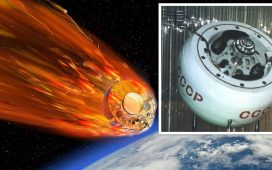A “gas station in space” may soon become a reality. Orbit Fab, an American company, is developing a system for on-orbit refuelling that includes fuel ports, refuelling shuttles, and orbital gas stations (refuelling tankers).
COMMERCIAL BREAK
SCROLL TO CONTINUE READING
However, the on-orbit refuelling won’t come cheap, its cost will start from a whopping $20 million.
The company behind it
The company has conducted tests, launched a fuel depot demonstrator, and is planning its next launch in 2024 for a mission with the Air Force Research Lab.
“We are delivering fuel in geostationary orbit for a mission that is being undertaken by the Air Force Research Lab,” said CEO Daniel Faber.
Also read | Playing action video games for an hour significantly boosts alertness: Study
“At the moment, they’re treating it as a demonstration, but it’s getting a lot of interest from across the US government, from people that realise the value of refuelling,” he added.
The company also has its first private customer lined up: Astroscale, a Japanese satellite servicing company, for its satellite designed for refuelling called LEXI. It is scheduled for launch in 2026.
Why does this matter?
Currently, the space is full of debris, a large part of which is made up of satellites, and space vehicles that have run out of fuel.
This initiative, as per CNN, comes as there is a growing interest in on-orbit servicing, which is seen as essential for a safe and sustainable development of space.
Also read | Astronomers detect oldest black hole ever observed. It’s a million times the mass of Sun: Report
Simone D’Amico, an associate professor of astronautics at Stanford University, noted that this is key to the safe and sustainable development of space.
“Could you imagine a ground mobility infrastructure, roads and cities, without gas stations and auto repair shops? Could you imagine single-use cars or aeroplanes?” he asked.
“The development of space infrastructure and the proliferation of space assets is reaching a critical volume that is not sustainable any more without a change of paradigm.”
“It’s probably the only company in the world that has positioned itself to deploy ‘gas stations’ in orbit,” said the Stanford University who has no affiliation with Orbit Fab.
“I think Orbit Fab’s approach is really visionary and can pay off in the mid to long term. However, it has high risk in the short term, since satellites have to be designed having reusability and refuelling in mind,” he added.
(With inputs from agencies)











